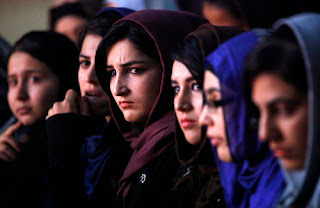Daily life in Afghanistan was much different some 40 years ago, before conflict started to take its toll on the country. With the country at peace then, the economy was thriving, employment was commonplace and the tourism industry was burgeoning, according to Joseph Hoyt, an American photographer, who captured facets of Afghan life in the early 1970s. A month-long exhibition of 50 photos taken by Mr. Hoyt was opened in the Afghan capital, Kabul, today (shown here), with the images highlighting the difference between lives lived amidst war and peace. The United Nations promotes peace goals as the dominant factor in all forms of arts and encourages revisiting history to discover how people contributed to their cultures. “Many thousands of Afghans have been killed and countless others have been maimed, blinded, displaced and nearly forgotten. Hope for Afghanistan’s future may lie in our ability to look back at an era in its recent past when the nation was at peace,” wrote Mr. Hoyt in his photographic book 'Afghanistan 1970-1975: Images From an Era of Peace,' which was also launched at the exhibition's inauguration.
Monday, 2 December 2013
World AIDS Day: 01 December 2013
United Nations agencies joined Afghanistan’s Ministry of Public Health today in observing World AIDS Day. UN agencies and the Government estimate that some 5,000 Afghans live with HIV - and that only 1,529 of these cases are registered. At an event in the capital, Kabul (shown in left and right images), to mark the Day, the country’s Deputy Minister for Health Services, Najia Tariq, cited prolonged conflict, drug production and addiction, poverty, illiteracy and migration among the factors contributing to HIV infections. In his message for the Day, UN Secretary-General Ban Ki-moon called for “continued investment, commitment and innovation” to reach the vision of zero new HIV infections, zero discrimination and zero AIDS-related deaths.
Wednesday, 27 November 2013
International Students Day at Kabul University: 27 November 2013
As
part of the observance of the 16 Days of Activism Against Gender-Based
Violence, which started earlier this week, the United Nations Development
Programme (UNDP) in Afghanistan today highlighted, at a ceremony with hundreds
of university students in the capital, Kabul, the need to reduce crimes against
women and girls. At the event, also organized to mark the International Day of
Students (17 November) – which was first observed in 1941 in recognition of
student activism – a UNDP official, Fulya Vekiloglu, said the UN agency is
working with the Afghan Ministry of Women’s Affairs to start a Master’s Degree
programme on gender studies at Kabul University. UNDP has previously helped
establish the Gender Studies Institute at the university, the largest tertiary
studies institution in the country. In addition to the observance ceremony,
today’s activities included speeches, music and theatre performances, and a
documentary screening on the theme of gender quality.
Monday, 25 November 2013
Determining the order of candidates on the ballot paper for 2014 Presidential and provincial Council Elections 25th November 2013.
The Independent Election Commission of Afghanistan (IEC) today determined, through a lottery system, the order of the candidates appearing on the ballot papers for next year’s Presidential and Provincial Council elections, slated for 5 April, at a ceremony in the Afghan capital, Kabul. Eleven Presidential and 2,713 Provincial Council candidates, some of whom were present at today’s event, are contesting the polls. The United Nations Assistance Mission in Afghanistan (UNAMA! ) is mandated to support – at the request of the Afghan authorities – the Afghan-managed and Afghan-led election. Last week, the UN Secretary-General’s Special Representative for Afghanistan, Ján Kubiš, urged Afghan electoral and state bodies, and the candidates and their teams, to take all measures to ensure the election process and their conduct are marked by “the highest degree of integrity, free from internal and external interference and fraud.”
Thursday, 21 November 2013
Tuesday, 19 November 2013
WORLD TOILET DAY: 19 NOVEMBER 2013
Today is the first ever United Nations-designated World Toilet Day. Worldwide, some 2.5 billion people – or half the population in the developing world – lack the benefits of adequate sanitation. According to the UN, access to sanitation is a recognized human right, a basic service required to live a normal life, and hygienic sanitation facilities are central to human and environmental health. In his message for the Day, UN Secretary-General Ban Ki-moon has called for placing sanitation at the heart of the international community’s post-2015 development activities. Access to hygienic sanitation is a challenge faced in Afghanistan – for example, its capital city, Kabul, has only 25 public toilets for more than three million people. The city’s mayor, Mohammad Yunus Nawandish, has called on the private sector to help address the problem through the construction of more public toilets.
Today is the first ever UN-designated World Toilet Day. Worldwide, some 2.5 billion people lack the benefits of adequate sanitation. In his message for the Day, UN chief Ban Ki-moon has called for placing sanitation at the heart of the international community’s post-2015 development activities. Access to hygienic sanitation is a challenge faced in Afghanistan – for example, its capital city, Kabul, has only 25 public toilets for more than three million people.
Subscribe to:
Comments (Atom)






















































